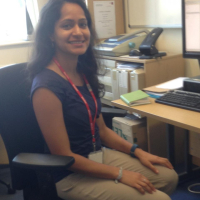
Monica Shah is a malaria epidemiologist at the Center for Disease Control and Prevention (CDC), Atlanta, Georgia, USA. She began her career in malaria as a laboratory scientist at CDC, using molecular skills from her background in biochemistry to detect genetic markers of antimalarial drug resistance for surveillance efforts and research studies in sub-saharan Africa
From 17 – 29 June 2018, the Cochrane Infectious Diseases Group (CIDG) editorial base welcomed Monica Shah as a visiting fellow. In this report she provides an insight into her involvement with the CIDG and her time at the CIDG editorial base in Liverpool.
How did you first become involved with the CIDG?
The Cochrane Review ‘Mass drug administration for malaria’ was first published in the Cochrane Library in December 2013. CIDG editors contacted our organization about updating this Cochrane Review in light of new evidence and review standards.
What were the objectives of this visit to the CIDG editorial base?
1. Finalise the studies to be included.
2. Complete the ‘Characteristics of included studies’ tables.
3. Agree the structure and comparisons.
4. Complete the data entry and analysis.
5. Draft the results section of the review.
6. Work on the GRADE assessments
7. Complete the ‘Summary of findings’ table with the team.
8. Manuscript/Review preparation for submission to the Evidence Review Group at WHO
Who have you met with at the CIDG/outside CIDG to help attain your objectives during your visit?
Dr. Paul Garner and Mr. Leslie Choi were CIDG members that I met with regularly during my visit. I also consulted with Ms. Marty Richardson for statistical advice and Dr. Paul Hine and Dr. Samuel Johnson for guidance on the Cochrane Review process. Philomena Hinds and Christianne Esparza also provided administrative support.
How has visiting the CIDG editorial base helped development of your protocol/review?
I gained a clearer understanding of the steps and processes needed to complete the Review. The opportunity to meet with members of CIDG in person was also extremely valuable for addressing questions, discussing challenges, and making decisions related to inclusion of studies and analysis. Without the in person time, it would have been much more difficult to facilitate the progress of the review and understand the resources available to authors.
What were the main results/outputs of your visit?
1. Gained an in depth understanding of the Review process and steps
2. Learned how to conduct analyses and organize information in RevMan
3. Finalised the studies to be included.
4. Completed the ‘Characteristics of included studies’ tables.
5. Summarised studies and outcomes in tables
6. Agreed the structure and comparisons.
7. Completed the data entry and analysis.
8. Worked on the GRADE assessments
9. Completed the ‘Summary of findings’ table with the team for two outcomes.
10. Discussed an outline of results and information to be provided to WHO for the upcoming Evidence Review Group meeting
What further work will need to be undertaken?
Data from unpublished studies will need to be finalised, assessed for risk of bias and included in GRADE assessments. The results section, figures, and tables in the Review will need to be drafted and finalised. A summary of results will need to be prepared for the upcoming WHO evidence review group meeting on MDA for malaria (Sept 2018). Regular teleconference calls with Leslie and Paul will be scheduled for continued input from CIDG.
What do you like about the city of Liverpool?
The summer temperatures and daylight were great and it’s a very easy place to explore! Albert Dock and the top of the Liverpool Cathedral were highlights!
The CIDG editorial base is located at the Liverpool School of Tropical Medicine in Liverpool, UK. The CIDG is led by Professor Paul Garner (Co-ordinating Editor) and Deirdre Walshe (Managing Editor). Over 600 authors from some 52 countries contribute to the preparation of the Cochrane Reviews. They are supported by an international team of Editors, each with topic or methodological expertise.
The CIDG’s main areas of work are on determination of the effects of interventions on the prevention or treatment infectious diseases of relevance to the United Nations Sustainable Development Goals, particularly malaria, tuberculosis, HIV/AIDS, and neglected tropical diseases. The aims of the CIDG are to impact on policy and research in tropical diseases through the production of high quality and relevant systematic reviews, and to lead developments in review quality improvement and effective dissemination of findings.
